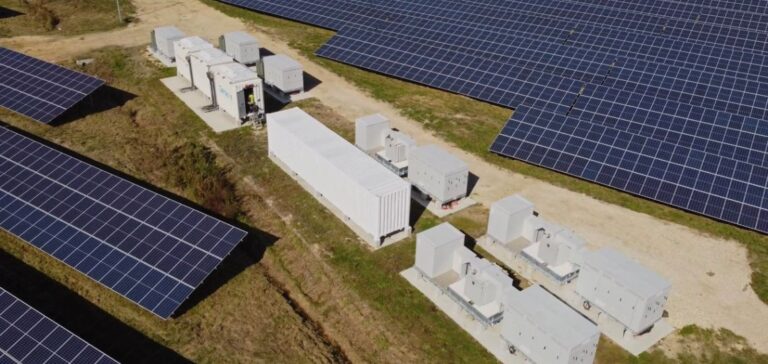The Australian energy industry celebrates a significant breakthrough with the commissioning of the PV-Battery hybrid project in Dalby, Queensland. This project, developed by Fotowatio Renewable Ventures (FRV) Australia, combines a 2.45 MWdc photovoltaic (PV) installation with a 2.54 MW/5 MWh battery energy storage system (BESS). This integration at a single point of connection to the national grid is an Australian first. FRV continues to strengthen its international presence, where it has already commissioned a number of photovoltaic projects, notably in Spain.
Technology and efficiency
Covering an area of 30 hectares, the Dalby project stands out for its ability to improve energy efficiency and grid resilience. The site is capable of supplying electricity to over 1,680 homes, illustrating the potential of hybrid systems to stabilize energy supply and manage demand more flexibly. The EPC contractor for this project is Gransolar, renowned for its technical expertise in energy projects.
Economic and industrial benefits
The Dalby project not only optimizes the use of energy resources, but also offers exciting prospects for the Australian energy industry. PV-BESS hybrid systems can reduce long-term operating costs and limit energy losses, while offering a more stable and reliable solution for the power grid. This hybrid technology is a direct response to the challenges of integrating renewable energies into a traditional energy grid.
Development Strategy and Outlook
Carlo Frigerio, CEO of FRV Australia, points out that the Dalby project is part of a wider strategy to strengthen the company’s energy portfolio in Australia. “This project is a milestone in our approach to technological innovation and sustainable development,” he declares. This initiative paves the way for future similar projects, increasing Australia’s ability to incorporate more renewable energy sources while maintaining grid stability. Christopher Curtain, OMERS Infrastructure’s Senior Managing Director for Asia-Pacific, says Dalby represents a major step forward for the company. “We are learning valuable lessons from this pioneering project, which will enable us to develop more hybrid projects and support Australia’s energy transition,” he adds.
Implications for the Energy Sector
The commissioning of the Dalby project marks a crucial step in the adoption of PV-BESS hybrid technologies in Australia. This model could be replicated on a larger scale, offering practical and efficient solutions to meet the growing demand for renewable energy. Combining photovoltaic and battery storage technologies is a promising approach for the future of the energy sector, both nationally and internationally. This project also illustrates the importance of innovation in the energy sector, enabling companies to remain competitive while meeting modern energy needs. The adoption of PV-BESS hybrid systems can play a key role in reducing energy costs and improving grid resilience. As the first of its kind in Australia, the Dalby project could serve as a model for other similar initiatives, supporting the evolution of the energy market and the transition to more sustainable and economically viable solutions.






















